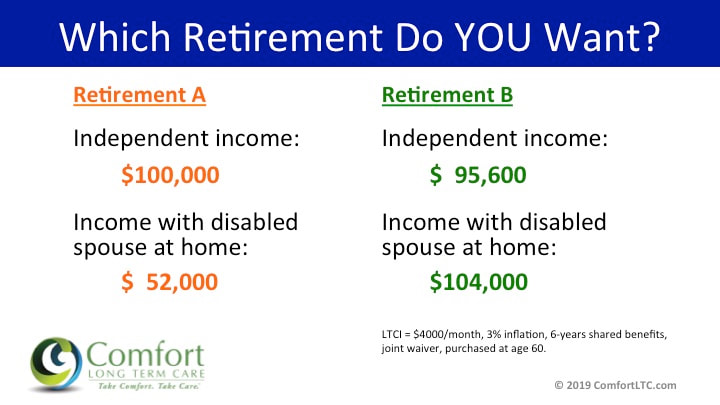|
Check out this article about a FL CCRC with a $1.5-million+ entrance fee! Then read our exclusive report on creating your own "Private CCRC Plan". A Comfort LTC Exclusive:How & why to create a "Private CCRC Plan"
0 Comments
Hybrid (or "linked-benefit", "combo" or "asset-based") LTC insurance options are exploding in the marketplace, and they are NOT all created equal. Are "hybrid" LTC policies with a death benefit really a better deal? You'll be surprised at what our analysis shows, and why you need to make sure you know ALL your options before you buy LTC insurance. The new Comfort LTC Hybrid LTCI Information Center will provide clear explanations of the many different types of plans along with detailed case study analysis to provide real-world examples and comparisons. CLICK HERE
|
Age at end of 2020 |
Maximum Deductible Premium |
40 or less |
$ 430 |
41 to 50 |
$ 810 |
51 to 60 |
$ 1,630 |
61 to 70 |
$ 4,350 |
71 and older |
$ 5,430 |
HOWEVER, if you have funds in a Health Savings Account (HSA) - or an employer-funded Health Reimbursement Account (HRA) - you CAN use those tax-free dollars to pay tax-qualified LTC insurance premiums up to the age-based, Eligible Premium amount shown above.
BUSINESS OWNERS (and spouses) get to take the age-based, Eligible Premium deduction "above-the-line" on page one of Form 1040 as part of the "Self Employed Health Insurance Deduction" (Line 29). This applies to owners of business incorporated or taxes as: Sole Proprietorships, Partnerships, or S-Corporations. (Shareholder/Employees of a "regular" C-Corporation can have the entire premium deducted - without limit - if paid as an employee benefit by the corporation.)
CLICK HERE TO LEARN MORE ABOUT BUSINESS DEDUCTIONS FOR LTCI.
The plan will provide $100 per day of benefits which will increase with inflation for a maximum of 365 days (1-year). Each day of benefits is considered a "unit" of coverage and units can be combined to pay for care services above $100/day, but that would also shorten the total benefit period. The benefit can be used to pay family members to provide care after they have completed a minimum amount of mandatory training.
Every employee in the state will have a payroll tax withholding to pay for the plan. The tax is 0.58%, or $0.58 for every $100 in payroll income. A person earning $4,000 per month would pay $23.20 per month.
Payroll deductions will not begin for 3 years, and no benefits will be paid for at least 3 years after that as the plan requires that employees pay in for a minimum of 3 of the previous 6 years to be eligible. To be fully "vested" in the plan an employee must pay in for at least 10 years.
"Self employed" people will not be automatically covered, but can opt-into the plan at the same payroll tax rate.
Employees who have private LTC insurance can opt-out of the tax and coverage.
A TV station in Houston, KHOU, even found an internet post from 2004 with nearly the same wording as this old-is-new-again misleading social media joke.
You can't compare "independent retirement living" with CARE in a nursing home - or an assisted living facility. Hotel staff - nor cruise ship staff - will bathe and dress you, help you to and from the toilet, nor will they make sure your dementia doesn't lead you out the front door into traffic - or over the rail into the ocean - in the middle of the night. Once you need CARE, you'll be on the curb - or the dock.
CLICK HERE to read my 2016 blog post for more details on why this is a ridiculous idea.
Licensed agents and advisors can access the new NAIFA Center for Limited and Extended Care Funding at: https://naifa.lifehappenspro.org
Click "Read More" below to check out this great infographic, and let us know if we can help you with any of your Medicare questions!
for older posts
Author
Bill Comfort
CSA, CLTC, LTCCP
The LTCpro®
Categories
All
Alzheimer's
Caregiving
Commentary
LTC Insurance
LTC Planning
LTC Tax Planning
Medicare
News
Rate Increases
Video
Archives
November 2023
October 2022
December 2021
February 2021
December 2020
October 2020
August 2020
June 2020
May 2020
April 2020
March 2020
January 2020
November 2019
September 2019
May 2019
March 2019
February 2019
October 2018
August 2018
March 2018
January 2018
August 2017
July 2017
March 2017
February 2017
November 2016
October 2016
August 2016
July 2016
June 2016
May 2016
April 2016
January 2016
November 2015
October 2015
August 2015
May 2015
April 2015
March 2015
February 2015
January 2015
December 2014
November 2014





 RSS Feed
RSS Feed



